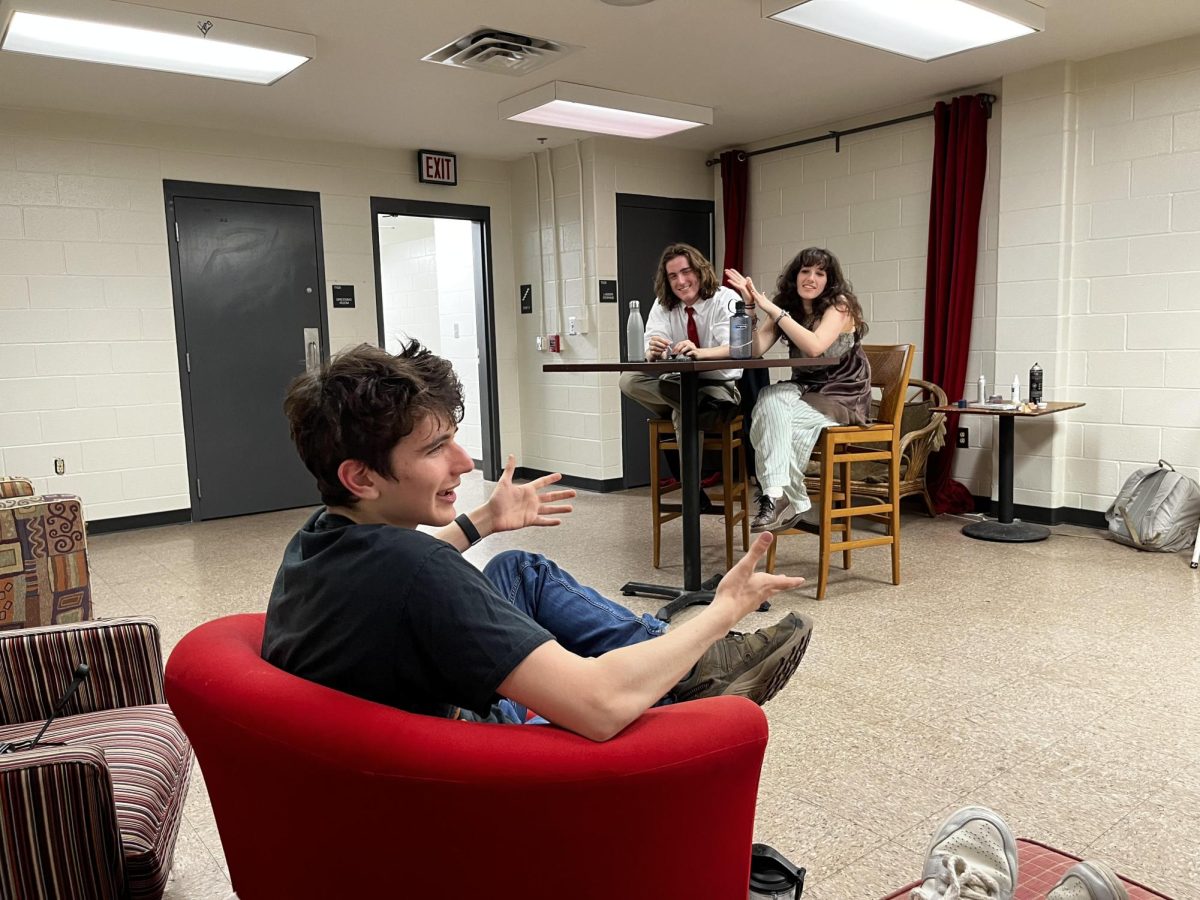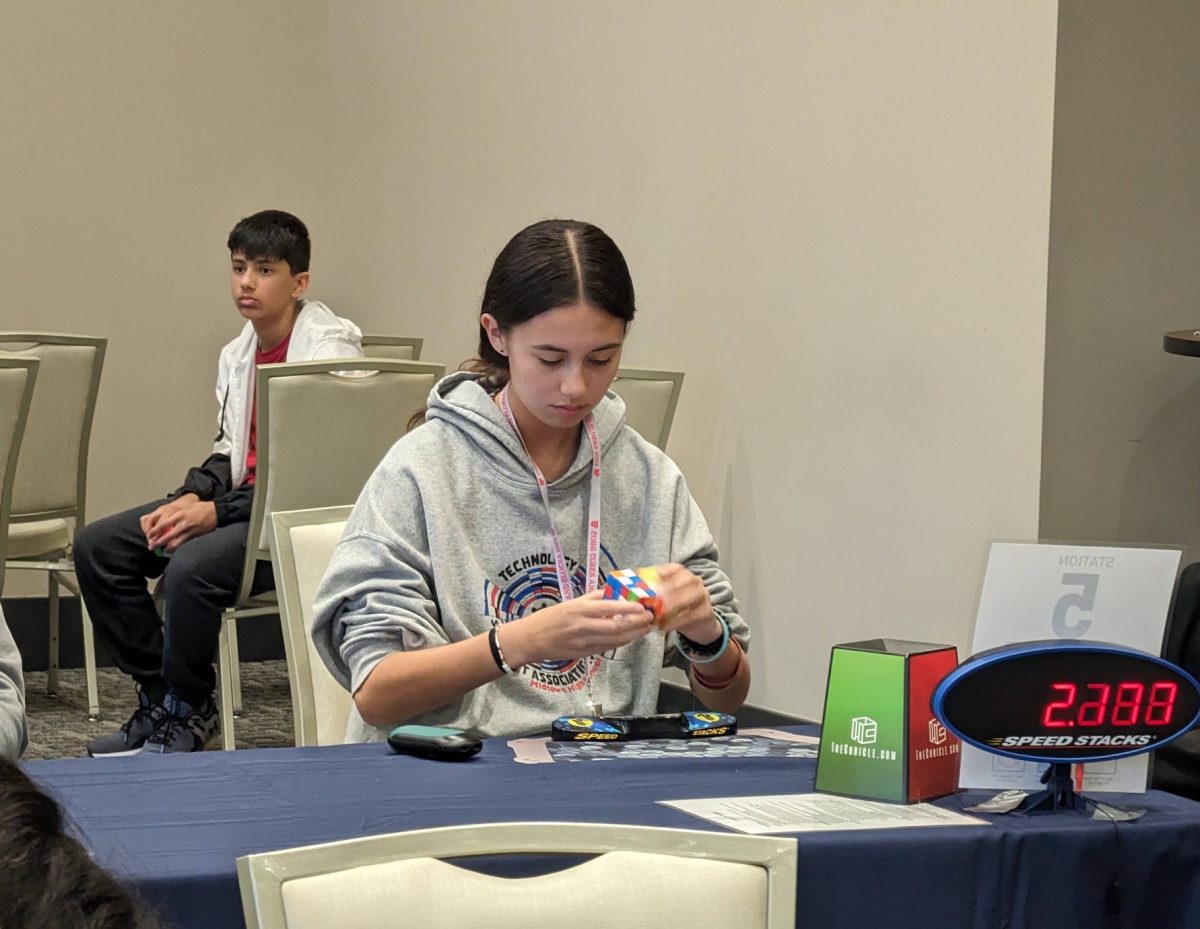By Jolie Jones
A tall woman flies across her classroom, her arms pounding against her chest as she stares back at a room of sixth graders. She cries out like a monkey as she points to her Promethean board.
“I want you to understand the difference between a gorilla and a guerrilla,” Maggie Edson said.
Edson has been teaching for 19 years and has been at Inman Middle School for two, teaching sixth-grade social studies. Her passion for teaching is apparent by the energy she brings to the classroom.
“I love history,” Edson said. “It’s just gossip, ‘who did what to whom.’ [History] is perfectly suited to sixth graders.”
In 1991, though, Edson wasn’t teaching. She was writing a play titled Wit.
While she was in college, Edson traveled to London with her partner Lindle Merrill, who was studying abroad in London. Every night they would go see plays.
“It was very inspiring for her,” Merrill said. “She got to see very good theater.”
When Edson was 25 years old, she worked as a unit clerk at a research hospital in her hometown of Washington, D.C. She loved her secretarial duties and the hustle and bustle of working in a hospital. She also enjoyed developing relationships with her coworkers and the patients residing there.
From this setting, Edson drew the inspiration for her first and only play: Wit. It is about a professor named Vivian Bearing who is diagnosed with stage-four ovarian cancer. The play follows Bearing’s battle against a cancer that is destined to take her life.
After writing Wit, Edson sent the script to 60 theaters. She received rejection letters and phone calls from all but one of the theaters, South Coast Repertory in Costa Mesa, Calif., which called her in for a reading. Once they read through the whole script they decided to produce her play.
“During the first [run-through] I sat quietly,” Edson said. “The last week of rehearsals, the director and I realized [the play] needed to be cut by an hour. It was a challenging week.”
With Merrill’s help, Edson shortened the play.
“Every time I’d ask her to cut something, she’d say ‘that’s my favorite part,’” Merrill said. “She had a character opening a Coke bottle with her teeth. There would have been blood everywhere! It wasn’t realistic.”
South Coast Repertory produced Wit in January of 1995 as a 90-minute play with no intermission.
“All of the theaters that had rejected it came around and performed it,” Edson said.
The widespread production of the play was only the beginning of Edson’s journey with Wit. In 1999, Edson was working at Centennial Olympic Park Elementary School when she was called into the principal’s office.
“I thought I was in trouble,” Edson said.
To her surprise, a phone call was waiting announcing she had won the Pulitzer Prize for Drama. Edson said it was a great feeling to win a Pulitzer, and to celebrate, she and Merrill went to Fellini’s and Zesto. Edson said the best part about winning was the attention it brought to Wit.
Four producers contacted her, interested in turning her play into a movie. Edson thought they should all have to write her an essay so she could better choose between her many suitors, but then a phone conversation changed her mind. When Edson asked Colin Calendar, the head of HBO, how she should choose the producer, he simply said, “You’re just going to have to pick someone you trust.”
Edson liked that approach and decided to let HBO produce the movie version of her play. Emma Thompson starred in the 2001 HBO film in the role of Professor Bearing. Edson decided to have nothing to do with the movie-making process.
“It is better for the director if the author is dead,” Edson said jokingly.
The movie was titled W;t. It was the movie editor’s idea to switch the ‘I’ to a semicolon—he watched the production and saw a semicolon as an additive to the theme of superficial and quick knowledge that appears throughout the story. Edson thought it was an ingenious idea.
When the movie was finally finished, Edson had nothing but positive things to say.
“I love the movie,” Edson said. “I think it is very sincere, very close to the script of the play, very quiet and gray and very heartfelt.”
Last spring the Manhattan Theatre Club contacted Edson wanting to perform Wit on Broadway.
Although Edson said all of her characters are fictional, she can identify with many aspects of Bearing’s character.
Just like Bearing, teaching is Edson’s true passion.
“[Edson] makes boring subjects fun because she uses a lot of emotion,” said Julia Clark, one of Edson’s sixth-grade students. “She makes learning easier so you can understand it.”
Two years ago she discovered she had multiple sclerosis, or MS, an autoimmune disease that affects the brain and spinal cord. Currently Edson wears ankle bracelets, and her balance is constantly unstable.
“It was a relief to find out what was wrong,” Merrill said. “She’d spent a couple of years having tests.”
Treatment doesn’t involve medicine but instead she has to relax, lie down and take a nap. MS could result in Edson being confined to a wheel chair one day but is very “mysterious,” so it is hard to say what her medical future holds, Edson said.
“[Edson] has a very big heart,” Merrill said. “She’s much more socially engaged [than Bearing]. Maggie never does the same thing twice. She’ll probably write something else, but not until she retires.”
“I’m a lot like Professor Bearing, but I’ve figured myself out, and she hasn’t,” Edson said.












